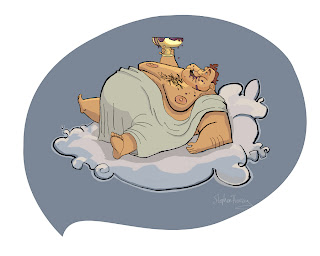 |
| Img credit: Magic the Gathering |
I only really had time for two techniques, individual brainstorming, an offshoot of free writing, and the team idea mapping method.
These two techniques were successful in that they produced ideas. But they didn't necessarily give me all the answers to my questions directly.
Okay, so you'll need a magic writing totem:
Aww. Okay, next:
You'll need a pen or pencil, paper, a timer, and a few extra brains....
The steps:
-- If you know exactly what you want to brainstorm about, skip to #5.
- Think of a question you'd like to know the answer to. (Individual Brainstorming) In my case, I was at a complete loss even to know what I wanted to brainstorm about. I had a story notion, but no story or even real characters, no structure, no POV or setting or theme. My first question was: "What things might I want to brainstorm about (regarding this story notion)?"
- Set a timer for three minutes.
- Write down everything that comes to mind as fast as you can. If your page is blank, write, My page is blank. Pictures, diagrams, hearts and emoticons--all this and more.
- Circle one of those new questions. Mine was about POV: "What are the pros and cons of keeping my POV character the same throughout installments?" I had already decided that the story should unfold in "episodes," though I didn't know if that meant chapters, short stories, novellas, or novels.
- Sit down with at least two other people. Begin the team idea mapping method.
- Title blank pieces of paper with your new question.
- Set timer for three minutes.
- Write down everything that comes to mind as fast as possible (see #3). Try to have everyone stay focused on the question, but straying is fine.
- Discuss.
- Pick a new question and repeat.
Eventually, you'll produce this...
At this point, you'll hopefully have wrangled up tons of ideas. Each iteration will spring from the last, like mental pathways branching and fracturing.
It's a good idea, when there's a question with two obvious parts, to brainstorm each part. For example, Part 1: pros and cons of single POV; part 2: pros and cons of multiple POVs.
Otherwise, you might spin off wildly on one mental path without ever questioning whether that was the best path to be on in the first place. Also, keeping discussion to a minimum will help prevent evaluation apprehension, or rather, brainstormers feeling unable to produce new ideas that might be shot down by the group.
Again, with brainstorming, success isn't always about finding the "right" answer, but generating lots of possible answers via different minds.
As writers, we're forever stuck in one mind--our own. Brainstorming in groups wherein participants write down all ideas anonymously, good and bad, before discussion is proven by research to foster more creativity.
Last, it's also proven that providing incentives ($, cookies, kitties!) gives better results.
~~Anyone else have any tried-and-true brainstorming tips?
Untested techniques?
Arguments for or against?~~
In the meantime, happy brainstorming!
--Lora
























